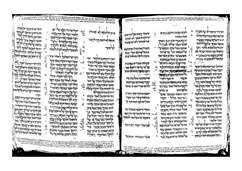Jeremiah 10
| Jeremiah 10 | |
|---|---|
 Book of Jeremiah in Hebrew Bible, MS. Sassoon 1053, images 283-315. | |
| Book | Book of Jeremiah |
| Bible part | Old Testament |
| Order in the Bible part | 24 |
| Category | Nevi'im |
Jeremiah 10 is the tenth chapter of the Book of Jeremiah in the Hebrew Bible or the Old Testament of the Christian Bible. This book contains the prophecies spoken by the prophet Jeremiah, and is a part of the Books of the Prophets.[1][2]
Text
- The original text is written in Hebrew language, except for verse 11 written entirely in Aramaic language.
- This chapter is divided into 25 verses.
Textual versions
Some most ancient manuscripts containing this chapter in Hebrew language:
- Masoretic Text (10th century)
- Dead Sea Scrolls: (2nd century BC)[3][4]
- 4QJera (4Q70): extant: verses 9‑14, 23
- 4QJerb (4Q71): extant: verses 2, 4, 9, 11, 13, 15, 18, 20‑22
- 4QJerc (4Q72): extant: verses 12‑13
Ancient translations in Koine Greek:
- Septuagint (3rd century BC)
- Theodotion version (~AD 180)
Structure
NKJV groups this chapter into:
- Jeremiah 10:1-16 = Idols and the True God
- Jeremiah 10:17-25 = The Coming Captivity of Judah
Verse 11
- Thus you shall say to them: “The gods that have not made the heavens and the earth shall perish from the earth and from under these heavens.”[5]
Verse 11 in Aramaic and Hebrew
Original text (Aramaic)
- כדנא תאמרון להון אלהיא די שמיא וארקא לא עבדו יאבדו מארעא ומן תחות שמיא אלה׃ ס
Transliteration of the Aramaic text
- kidna temerun lehon; elahaiya di syemaiya wearqa la abadu, yebadu meara umin tekhoth syemaiya eleh. (s)
Hebrew translation for comparison:
- כזאת תאמרו להם האלהים אשר לא עשו השמים והארץ יאבדו מן הארץ ומן תחת השמים אלה
Transliteration of the Hebrew text
- kazoth tomeru lahem; ha elohim asyer lo asu ha'syamayim weha'aretz, yobedu min ha'aretz, umin takhath ha'syamayim eleh.[6]
Verse 11 notes
The whole verse 11 is written in Aramaic or Chaldean that was commonly spoken in Babylonia in 6th century BC, while other verses in the Book of Jeremiah are written in Hebrew language.[6] Apparently "a gloss in Aramaic",[7] this sentence could serve as a prepared reply for the Jews in exile when they were persuaded by the other nations to worship foreign gods or idols.[8]
Verse 13
- When He utters His voice,
- There is a multitude of waters in the heavens:
- “And He causes the vapors to ascend from the ends of the earth.
- He makes lightning for the rain,
- He brings the wind out of His treasuries.” (NKJV)[9]
Cross reference: Psalm 135:7
- Jeremiah reminded the people that God has control of nature and their ongoing life.[10]
See also
- Related Bible parts: Psalm 135, Jeremiah 9
Notes and references
- ↑ J. D. Davis. 1960. A Dictionary of the Bible. Grand Rapids, Michigan: Baker Book House.
- ↑ Theodore Hiebert, et al. 1996. The New Interpreter's Bible: Volume VI. Nashville: Abingdon.
- ↑ Timothy A. J. Jull; Douglas J. Donahue; Magen Broshi; Emanuel Tov (1995). "Radiocarbon Dating of Scrolls and Linen Fragments from the Judean Desert". Radiocarbon. 38 (1): 14. Retrieved 26 November 2014.
- ↑ Ulrich 2010, p. 562-564.
- ↑ Jeremiah 10:11
- 1 2 Commentary on the Bible, by Adam Clarke [1831].
- ↑ The New Oxford Annotated Bible with the Apocrypha, Augmented Third Edition, New Revised Standard Version, Indexed. Michael D. Coogan, Marc Brettler, Carol A. Newsom, Editors. Publisher: Oxford University Press, USA; 2007. p. 1094-1095 Hebrew Bible. ISBN 978-0195288810
- ↑ J.E.H. Thomson. Aramaic; Aramaic Language. International Standard Bible Encyclopedia.
- ↑ Jeremiah 10:13
- ↑ The Nelson Study Bible 1997, p. 1243-1245.
Bibliography
- Ulrich, Eugene, ed. (2010). The Biblical Qumran Scrolls: Transcriptions and Textual Variants. Brill.
- The Nelson Study Bible. Thomas Nelson, Inc. 1997. ISBN 9780840715999.